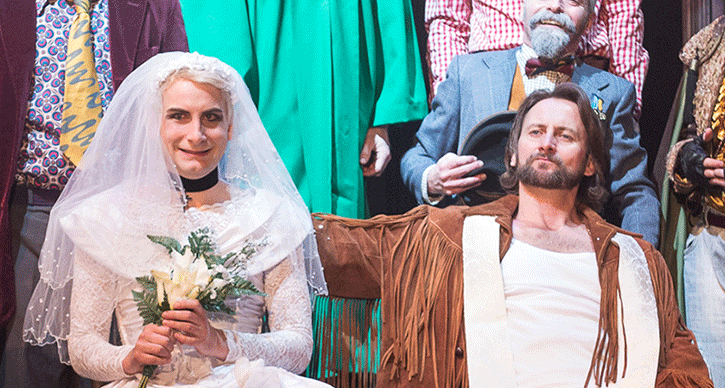Propeller Blog: The Actor’s Freedom
Editor’s Note: Propeller performs Twelfth Night and The Taming of the Shrew in Ann Arbor, February 20-23. Leslie Stainton covered the company’s last visit to Ann Arbor in 2011 with Richard III. This post is a part of a series.

Photo: The Taming of The Shrew. Photo by Manuel Harlan.
I’ll confess up front I’d never seen Taming of the Shrew before. Never even read it. I had some gauzy idea—probably from Kiss Me Kate—that it was a happily-ever-after story about an ideally matched couple who couldn’t figure out they were meant for each other until they’d sparred around for two hours and wound up kissing.
I now know—or suspect—the reason I didn’t know the show is because it doesn’t get done all that much. And that’s because, like Merchant of Venice, it deals with things that make us very, very, very uncomfortable.
One of the first questions asked at the post-show Q&A last night: “Was it a comedy tonight?”
Answer, from a cast member: “The funniest thing about it is how stupid the men in the play are.”
In a book I return to regularly, The Actor’s Freedom, critic Michael Goldman argues that one reason we need theater is because of the actor’s freedom to handle “fearful materials…While on stage, the actor enjoys a kind of omnipotence, a privilege and protection not unlike that accorded sacred beings—whatever he is doing, whatever crimes he may appear to commit, he is not to be interfered with.”
You see Goldman’s idea played out to magnificent effect in this bracing, brutal show about domestic violence, staged as a play within a play—a merciful choice, as it turns out, because it releases us from what would otherwise be unbearable. (I dare anyone to smile at the show’s climactic image of Kate, as broken dog.)
Not that Propeller’s Shrew doesn’t have its moments of wild comedy or brilliant color or hip-thrusting ’70s tunes. But my guess is that’s not the part you’ll remember most. In the same week we marked the 50th anniversary of Betty Friedan’s Feminine Mystique, this production reminds us that Kate’s experience of spousal abuse is neither unique nor obsolete—as a number of cast members pointed out after last night’s show. Here’s Benjamin O’Mahoney (Grumio and Pedant) [start at 4:25 for related comment]:
Last night, as I watched actors play characters who were in turn playing characters, I realized again how vital this process is if we’re to confront and understand our basest selves. Identity is the “covert theme of drama,” Michael Goldman suggests. The fact that with Propeller, you’re seeing actors who played someone entirely different the night before only deepens the experience.
It’s a rare pleasure to see actors in rep like this, and to remember that this is how the theater once worked. Companies spent months on the road, traveling from town to town (we’ve got an old road house down the road from us in Adrian), switching roles nightly or sometimes twice in a day, layering roles upon roles. A huge nod of gratitude to Propeller for reviving the tradition and reminding us of the theater’s liberating powers.






